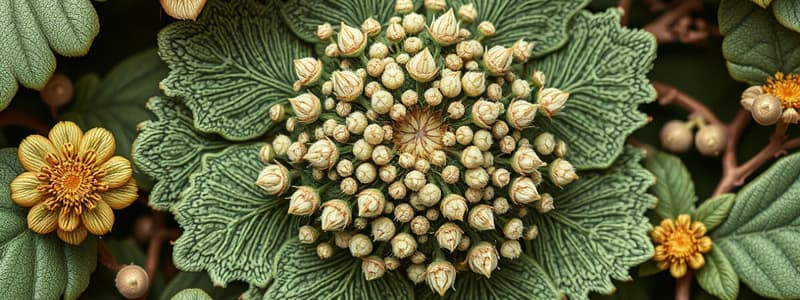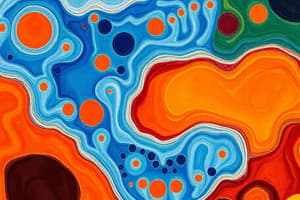Podcast
Questions and Answers
Which type of tissue primarily contributes to the growth of plant roots and shoots?
Which type of tissue primarily contributes to the growth of plant roots and shoots?
- Meristematic tissue (correct)
- Epidermis
- Cork tissue
- Permanent tissue
What is the primary function of cork tissue in plants?
What is the primary function of cork tissue in plants?
- Transporting nutrients
- Facilitating photosynthesis
- Preventing water loss (correct)
- Providing structural support
Which of the following is NOT a type of meristematic tissue?
Which of the following is NOT a type of meristematic tissue?
- Apical meristem
- Intercalary meristem
- Parenchyma (correct)
- Lateral meristem
Which tissue serves as the protective outer layer of plant organs?
Which tissue serves as the protective outer layer of plant organs?
In which part of a plant would you most likely find permanent tissue?
In which part of a plant would you most likely find permanent tissue?
What role does the vascular cambium play in plants?
What role does the vascular cambium play in plants?
Which type of meristem is primarily responsible for stem growth after damage in monocots?
Which type of meristem is primarily responsible for stem growth after damage in monocots?
How do meristematic cells differ from specialized plant cells?
How do meristematic cells differ from specialized plant cells?
Which of the following statements about primary meristem is true?
Which of the following statements about primary meristem is true?
What distinguishes cork cambium from vascular cambium?
What distinguishes cork cambium from vascular cambium?
Which meristem is primarily located at the tips of shoots and roots in dicots?
Which meristem is primarily located at the tips of shoots and roots in dicots?
What is the primary function of secondary meristematic tissue?
What is the primary function of secondary meristematic tissue?
Which of the following best describes the role of meristematic cells during mitosis?
Which of the following best describes the role of meristematic cells during mitosis?
Which type of meristem helps in increasing plant girth?
Which type of meristem helps in increasing plant girth?
What characteristic is typical of meristematic cells compared to regular plant cells?
What characteristic is typical of meristematic cells compared to regular plant cells?
Flashcards are hidden until you start studying
Study Notes
Plant Tissue Types and Functions
- Meristematic tissue is responsible for the growth of plant roots and shoots, enabling plants to extend and develop in size.
- Cork tissue, a type of protective tissue, forms the outer layer of plant organs, providing insulation and protection from physical damage and pathogens.
- Parenchyma, collenchyma, and sclerenchyma are types of permanent tissue, while meristematic tissue, including apical and lateral meristems, is primarily involved in growth; therefore, permanent tissue is not considered a type of meristematic tissue.
- The epidermis serves as the protective outer layer of plant organs, playing a crucial role in reducing water loss and deter pests.
- Permanent tissue is commonly found in mature regions of the plant, including stems, leaves, and roots, where it performs specialized functions.
Meristematic Tissue
- Secondary meristematic tissue enables lateral growth in plants, formed by lateral meristem.
- Two main types of secondary meristem: vascular cambium and cork cambium.
- Vascular cambium generates phloem (nutrient transport) and xylem (water transport) tissues.
- Cork cambium produces the protective outer layer on woody and herbaceous plants.
Primary Meristematic Tissue
- Responsible for primary (vertical) growth in plants.
- In dicots, primary meristem is located in the apical meristem at the tips of shoots and roots.
- In monocots, intercalary meristem is found at nodes, aiding stem growth after damage.
- Differentiates into three specialized layers of plant tissue.
Types of Meristems
- Three primary types of meristems:
- Apical meristem
- Intercalary meristem
- Lateral meristem
- All types regulate mitotic division, where one cell divides into two identical daughter cells.
Characteristics of Meristematic Cells
- Unique for being undifferentiated with self-renewal ability.
- During division, one daughter cell remains meristematic while the other specializes.
- Meristematic cells have thinner cell walls compared to differentiated plant cells.
- Characterized by dense liquid in cytoplasm and absence of vacuoles.
- Possess a large, prominent nucleus.
Functions of Meristematic Tissue
- Primary function is to generate new growth in plants.
- Collectively, meristematic cells form meristematic tissue, facilitating growth and development.
- Able to create specialized cells that execute specific functions within the plant.
Examples of Meristematic Tissue
- Observable in the bark of trees and the fresh growth on shoots and roots.
Studying That Suits You
Use AI to generate personalized quizzes and flashcards to suit your learning preferences.




